INTERVIEW各类面试
INTERVIEW各类面试
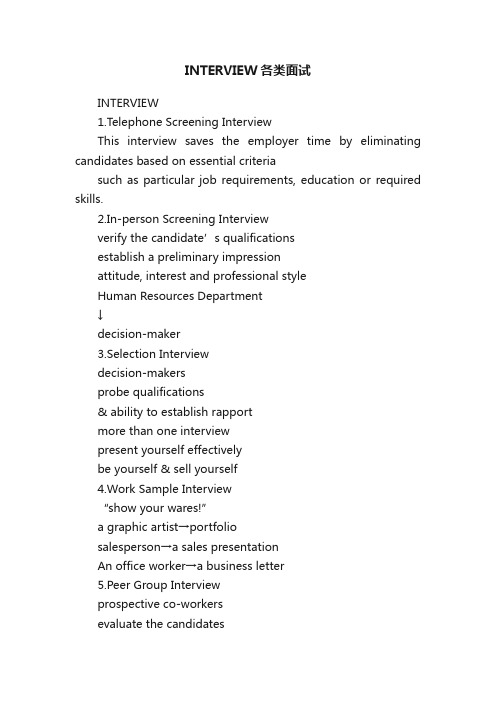
INTERVIEW各类面试INTERVIEW1.Telephone Screening InterviewThis interview saves the employer time by eliminating candidates based on essential criteriasuch as particular job requirements, education or required skills.2.In-person Screening Interviewverify the candidate’s qualificationsestablish a preliminary impressionattitude, interest and professional styleHuman Resources Department↓decision-maker3.Selection Interviewdecision-makersprobe qualifications& ability to establish rapportmore than one interviewpresent yourself effectivelybe yourself & sell yourself4.Work Sample Interview“show your wares!”a graphic artist→portfoliosalesperson→a sales presentationAn office worker→a business letter5.Peer Group Interviewprospective co-workersevaluate the candidatesdetermining how he/she would fit in6.Group Interviewalso called panel interview(≧3)all asking questionsshow confidencemaintain eye contact with the other group membersHow to shine in a group interview ?There are mainly two types of questionscreative / problem-solving questions1)active talking is better than creative ideas2) to talk your ideas bravely (make a summary, and set another topic) ?3) effective communication4) take notes and make some supplements5) be clear and confident6) be concentrated and avoid unacceptable non-verbal behaviors. 7.Luncheon Interviewhow to handle in a social situationManager(HR Department),employeesmake an impressionTips:Select healthy and easy things to eat↓questions ,conversation8.Stress Interviewinterrogatorbe treated like the enemya number of offensive questionskeep cool & take time in respondinghandle stress。
interview 面试
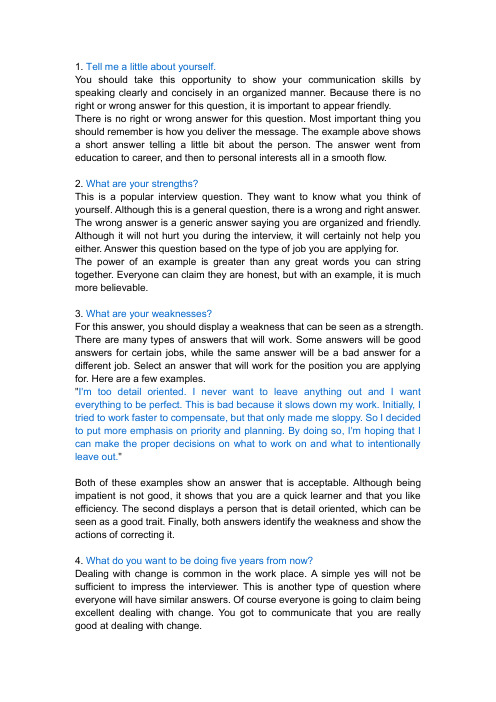
1. Tell me a little about yourself.You should take this opportunity to show your communication skills by speaking clearly and concisely in an organized manner. Because there is no right or wrong answer for this question, it is important to appear friendly.There is no right or wrong answer for this question. Most important thing you should remember is how you deliver the message. The example above shows a short answer telling a little bit about the person. The answer went from education to career, and then to personal interests all in a smooth flow.2. What are your strengths?This is a popular interview question. They want to know what you think of yourself. Although this is a general question, there is a wrong and right answer. The wrong answer is a generic answer saying you are organized and friendly. Although it will not hurt you during the interview, it will certainly not help you either. Answer this question based on the type of job you are applying for.The power of an example is greater than any great words you can string together. Everyone can claim they are honest, but with an example, it is much more believable.3. What are your weaknesses?For this answer, you should display a weakness that can be seen as a strength. There are many types of answers that will work. Some answers will be good answers for certain jobs, while the same answer will be a bad answer for a different job. Select an answer that will work for the position you are applying for. Here are a few examples."I'm too detail oriented. I never want to leave anything out and I want everything to be perfect. This is bad because it slows down my work. Initially, I tried to work faster to compensate, but that only made me sloppy. So I decided to put more emphasis on priority and planning. By doing so, I'm hoping that I can make the proper decisions on what to work on and what to intentionally leave out."Both of these examples show an answer that is acceptable. Although being impatient is not good, it shows that you are a quick learner and that you like efficiency. The second displays a person that is detail oriented, which can be seen as a good trait. Finally, both answers identify the weakness and show the actions of correcting it.4. What do you want to be doing five years from now?Dealing with change is common in the work place. A simple yes will not be sufficient to impress the interviewer. This is another type of question where everyone will have similar answers. Of course everyone is going to claim being excellent dealing with change. You got to communicate that you are really good at dealing with change.5. Do you work well under pressure?In most cases, the best answer to this question is answering yes. Working well under pressure is a good trait to have. However, I think if you answer that you work the same with pressure and without pressure, the interviewer will be more impressed. However, you will need to explain in words why this is better. Here are some of my answers."I have a couple of friends who hate working under pressure. I don't know if it's odd, but I really enjoy working under pressure. I use the feelings of pressure as a tool to motivate me to work harder and more efficiently. In my last job, I remember we had a project to complete in 4 days where it usually took 10 days. There was a lot of panic by some team members, but I ensured everyone that if we concentrate on the task and work real hard, we can complete the project. It took a lot of overtime, and the last day we were in the office until two AM, but we managed to finish. It was hard work, but I really enjoyed that experience." "To tell you the truth, I think I work the same if there's pressure or if there's no pressure. I try and take out negative emotional factors and work hard regardless of down time or busy time. I always prioritize and organize my work, and from there, work efficiently. If the situation involved pressure due to a lack of time, then the only difference in my work would be the extra time I would need to put in to meet the deadline on time. Since I believe my normal work is great work, then I suppose I work well under pressure."6. Why should I hire you?To answer this question, you need to know exactly what they are looking for. With this information, tie it in with your strong traits. This will verify that you are completely qualified for the job. Second and more importantly, you need to stand out more than the other people interviewing for this position.using experience and skills to convince the interviewer to hire him or her. In addition to talking about past experiences, this example also emphasizes the strong ability to mentor people."The reason I applied for this position is because the qualifications matched my strengths perfectly. I'm good at juggling multiple tasks, I'm very detail oriented, and I organize my time very efficiently. But the truth is that many people have these traits. But if I were in your position, I would hire myself because of the passion I have for this industry, and my optimistic personality. My education background and my strengths show that I can do this job. But I want to make more of an impact than just doing my job. I don't want to blend in with the company, I would rather want my addition to improve it."7. 'Tell me about...'type of questions are very popular. It is more effective because it is asking for an answer that comes from experience. If you don't have a particular experience in one of the questions below, make one up. You should prepare ahead of time because you don't want to make up a story during the interview. It will be too hard to sound believable. Finally, you should know that some questions will not be asked to certain job types. For example, if you are not in a management position, you probably won't be asked how you saved the company money. Or if you are not in sales, you won't be asked about making a great sale.These types of answers are usually long because it is explaining an experience. If you want the interviewer to understand the significance of your story, they will need to understand it. I encourage you to think back to your experience and create one.8. "Tell me about a time you made a mistake."The best answer for this question involves learning something from a mistake. If you are having difficulty thinking about a mistake you made that will be an effective answer, try to think of a lesson you learned that improved a good trait. Making a mistake is not good, but since you have to tell them something, you should tell them something that makes you look good."I had a project I was working on, and while I was in the middle of typing up my documentation, my computer started acting weird. It froze for a while and so I rebooted. After 10 minutes, the computer showed a blue screen saying that there were problems and recommended that I reboot the computer again. After another reboot, everything appeared to be ok. I continued my work and finished for the day. I spent two days on this assignment and when I went to retrieve my data the next day to double check my work, my computer wouldn't start up. A technician came and found that my hard drive malfunctioned. I lost all the data and lost two days of work. I was disappointed and thought I would never trust a computer again, but there was a great lesson to be learned. I had a couple of warnings and I ignored them. From then on, I practiced being someone who can anticipate problems. I now think of potential problems ahead of time and pay attention to details along the way. If I applied this sooner, I would have saved the data on another computer and I wouldn't have lost a couple days of work. But I can't say I regret making the mistake because it made me someone who can anticipate problems better."This is a minor mistake, and you can say it is really the computer's fault. But this is a good example because I wasn't really at fault. The computer was. But this example is wording it so it looks like the person's fault and it explains howa great lesson was learned. In the end, this candidate became a better person through this mistake. Learning from a mistake is probably the key point here, and this example demonstrates that.。
interview questions面试问题及回答

Q. Tell me about yourself.A. I am Li Wei and you can call me Wayne. I am a master degree candidate from Huazhong Normal University. My major is English-Chinese translation so that I am proficient at the two languages. As for personality, I am an energetic optimistic man so that I am willing and able to learn new things in an efficient way. I used to be a teacher and a part-time translator. My work experience offered me the ability to analyse an issue efficiently, to communicate smoothly and to work under pressure methodically. Moreover, I am good at using internet search engine to find out useful information. In my spare time, I love reading books and playing football.Q. Why MP?A. First, as a leading professional recruitment consultancy that has 152 offices in 32 countries, Michael Page is attractive enough. Undoubtedly MP is successful indeed. Everyone would like to join a successful company and I am no exception. Moreover, I am very interested in consulting for, in my opinion, consulting means helping other people to analyse and solve their problems, say find a new job for them and so on. Last but not least, I think that I am suitable to the position I applied for, because, as I have mentioned, I am a quick-learner and I am good at finding out key points of a problem. I am certain that I can maximize my strengths in Michael Page.Q. What are your strengths?A. 1. Proficient at Mandarin and English and strong communication skills, so I can communicate with other people without difficulty, no matter Chinese or foreigners;2. Good time arrangement, it means that I know what I should do at the first place and what I should attend later.3. Acute problem analyze, I am able to find key aspects of a problem, say, why this problem comes up; how it exists and what should we do.Q. What are your greatest weaknesses?A. I used to think decision-making is very important so that sometimes I would be a little hesitated to make a decisive decision before I am certain that I have master all information. However, now I have changed a lot for I know that sometimes the decision must be made in a short tome once I have analysed all key information.Q. What have been your achievements to date?A. I think my achievements can be divided into three aspects.As a teacher, I taught students English. In my teaching, I adopted a lot of new things, say multimedia measures to arouse students’interest so that my students did very well in learning English. This example showed my creativity.As a translator, I have translated more than 100,000 words. This part-time job gave me the ability to work efficiently in a team under pressure for translation tasks are often of urgent deadlines.Lastly, as a master degree candidate, I got a good GPA which is about 3.2/4.0. Moreover, in the master program I learnt how to identify and analyse an issue, to collect usefulinformation. Most importantly, I have acquired the ability to work in a team for I organized a translation group which often holds meetings to discuss problems emerged in our study and translation.Q. What is the most difficult situation you have faced in your work?A. In fact, I don't think there is something that is really difficult. In my opinion, if we work together to analyse the so-called difficulty carefully, we shall certainly find out the resolution. So, in a team, if one or more members lack cooperation, I will find it difficult. I remembered when I was a teacher. Once the headmaster asked we three young men to compile an excel document to store information of all students, including graduates. In fact it was not very difficult, we could have finished it in a week if we three worked together but one of us knew little about excel and to make things worse, he was unwilling to study it even I have told him that I would teach him. So, we two poor guys had to do this task which should have been done by three. Finally we took about one and a half weeks to finish it and, most important, both of us were not very happy.Q. What did you like/dislike about your last role?A. My last job is a teacher. I like this job, because I learned skills of communication and analysis which are very important in being a good teacher. I communicate with my students to know what problems they are facing and analyse the problem with him/her in order to solve it. This process is what I like the most.As per dislikes, I don’t think there were too much. But, the school in which I worked if very small in scale. There were only twenty-odd teachers, so it was not very easy to achieve a higher goal. This is the very reason why I decided to take postgraduate entrance exams and this is also the very reason why I decided to apply for this trainee consultant program.Q. What are you goals for the future?A. In fact, my life goal is simple - to be a useful man for this country. However, it does not mean that my life journey will be smooth with which I am fully acquainted. I hope my life will go like this: first, join a leading professional company in which I will be able to improve myself on all aspects especially on communication, creativity and leadership; then, be a member of a group and finish a series of tasks where I can improve intelligence, exercise industriousness and foster collaboration; finally, become an eligible leader of a group,department or even a company after many a said task. (待修改)。
50 Job Interview Questions50道英文面试题

50 Job Interview Questions, why they areasked and how to Answer!This is the most comprehensive list of questions commonlyasked in Job Interviews, why they are asked, if they haveany hidden motives and exactly how to answer them!1. Why Do Y ou Want T o Work For Us?2. What interests you about this job?3. What do you know about our company?4. What challenges are you looking for in this position?5. Who was your best boss and who was the worst?6. Why did you choose this particular career path?7. What are your aspirations beyond this job?8. Why do you think this industry would sustain your interest in the long haul?9. T ell me about yourself.10. What has been the biggest disappointment in your life?11. What are your pet peeves?12. If you could relive the last 10 years of your life.13. How has your education prepared you for your career?14. When was the last time you were angry and what happened?15. How do you evaluate success?16. What are the major reasons for your success?17. Describe a typical work week for you.18. How would you describe the pace at which you work?19. Give us an example of a situation where you didn't meet your goals or objectives.20. Give me proof of your persuasiveness.21. Would your current boss describe you as the type of person who goes that extra mile?22. Give us an example of a situation where you faced conflict or difficult communicationproblems23. Have you ever had a conflict with a boss or professor? How was it resolved?24. If you know your boss is 100% wrong about something, how would youhandle this?25. Where do you see yourself in 3 / 5/ 10 years time?26. How do you plan to achieve those goals?27. What drives you to achieve your objectives?28. What are you looking for in your next job? What is important to you?29. What would your current manager say are your strengths?30. What would your current manager say are your weaknesses?31. Are you overqualified for this job?32. Why should we give you this job?33. We're considering two other candidates for this position. Why should we hire yourather than someone else?34. What would you do if one of our competitors offered you a position?35. What are your biggest accomplishments?36. What did you like/dislike about your last job?37. Can you work under pressure?"38. What environments allow you to be especially effective?39. What do you find are the most difficult decisions to make?40. Give us an example of when you have worked to an unreasonable deadline or beenfaced with a huge challenge.41. T ell me about a special contribution you have made to your employer.42. What is the most difficult situation you have faced?43. T ell me about a time when you had to deal with an irate customer. How did you handlethe situation?44. How do you take direction?45. What colour is your brain?46. Do you prefer working in a team or on your own?47. What do your work colleagues think of you?48. T ell me about your salary expectations.49. What will you do if you don't get this position?50. What is the first thing you would change, if you were to start work here? Question 1: Why Do You Want To Work For Us?It‟s rare for an interview not to include this question.The good news is that it‟s an easy one to prepare for.Most companies want to recruit people who are enthusiastic about the company and itsproducts. They don‟t want people on the team who “ended up there by accident”. So this isyour chance to show why working for the company is important to you and why you thinkyou will fit in.They will be looking for evidence that you can make a contribution and will beable to growinto the role they are recruiting.This question is designed to screen out candidates who aren‟t serious about the companyor may be using it as a stop-gap, while they look for something better.It‟s als o your chance to make the most of the company research you have done. Y ou canuse this opportunity to add comments that show you understand the company‟s position inthe market place; the role of its competitors and any challenges it may be facing.Sample Answer: “I'm not looking for just another pay check. I enjoy my work and am proudof my profession. Y our company produces a superior product/provides a superior service. Ishare the values that make this possible, which should enable me to fit in and complementthe team."Question 2: What interests you about this job?When you're asked what interests you about the position you are interviewing for, the bestway to respond is to describe the qualifications listed in the job posting, then connect themto your skills and experience. That way, the employer will see that you know about the jobyou're interviewing for (not everyone does) and that you have the qualifications necessaryto do the job.For example, if you were interviewing for a Human Resources Manager job where youwould be responsible for recruiting, orientation, and training, you will want to discuss howyou were responsible for these functions in your past positions, and why you are interestedin continuing to develop your expertise in Human Resources management. Another example would be if you were interviewing for a Programmer / Analyst position. Inthat case, you would mention your interest in learning and excelling at new technologies,your experience in programming both new applications, and your interest in and yourability to problem solve.In all cases, you will want to convey your enthusiasm for the opportunity to interview, alongwith your solid ability to do the job.Question 3: What do you know about Our Company?A typical job interview question, asked to find out how much company research you haveconducted, is "What do you know about this company?"Prepare in advance, and in a word, research, so, you can provide relevant and currentinformation about your prospective employer to the inte rviewer. Start by researching thecompany online. Review the "About Us" section of the company web site. Google thecompany, read blogs that mention it, and check Discussion Boards and social networkingsites.Use the information you have gathered to create a bulleted list of relevant information thatyou can easily remember during the interview. T aking the time to research will help youmake a good impression with how much you know about the company. Question 4: What challenges are you looking for in this position?A typical interview question to determine what you are looking for your in next job, andwhether you would be a good fit for the position being hired for, is "What challenges areyou looking for in a position?"The best way to answer questions about the challenges you are seeking is to discuss howyou would like to be able to effectively utilize your skills and experience if you were hiredfor the job.Y ou can also mention that you are motivated by challenges, have the ability to effectivelymeet challenges, and have the flexibility and skills necessary to handle a challenging job.Y ou can continue by describing specific examples of challenges you have met and goalsyou have achieved in the past.Question 5: Who was your best boss and who was the worst?I've learned from each boss I've had. From the good ones I learnt what to do, from thechallenging ones - what not to do.Early in my career, I had a mentor who helped me a great deal, we still stay in touch. I'vehonestly learned something from each boss I've had.Question 6: What have you been doing since your last job?If you have an employment gap on your resume, the interviewer will probably ask you whatyou have been doing while you were out of work.The best way to answer this question is to be honest, but do have an answer prepared.Y ou will want to let the interviewer know that you were busy and active, regardless ofwhether you were out of work by choice, or otherwise.As I said, it doesn't really matter what you did, as long as you have an explanation. Hiringmanagers understand that people lose their job - it can happen to anyone - and it's notalways easy to find a new job fast. Also, there are legitimate non-employment reasons forbeing out of the workforce.Question 7: Why did you choose this particular career path?Sometimes in interviews, you will be asked questions that lend themselves to be answeredvaguely or with lengthy explanations. T ake this opportunity to direct your answer in a waythat connects you with the position and company, be succinct and support your answerwith appropriate specific examples.Sample Answer: "I chose advertising because I have always been a strong communicatorwith a good eye for design. I have a particular interest in creating dynamic eye-catchingpieces that support a new product being introduced to the market. I also like the fast-pacedhigh-energy environment that seems to be commonplace in the advertising industry."Advice: Y our answer needs to convince the interviewers that your skills are exactly whatthey want. They want to know if you have a realistic view of what it is like to work in theirindustry. Be specific; show them that their industry and your career goals are in sync.Question 8: What are your aspirations beyond this job?Again, don't fall into the trap of specifying job titles. Stick to a natural progression you seeas plausible. How should this job grow for the good of the organization? Then turn yourattention once again to the job at hand. If you seem too interested in what liesbeyond thisjob, the interviewer will fear that you won't stick around for long.Sample Answer: Beyond this job as a marketing assistant, I see myself moving up throughmarketing analysis into brand management and eventually running a category. I'm awarethat there are several skills I need to develop in the interval, and I believe with yourcontinuing-education program and my own motivation for self-improvement, I'll have thoseskills when the opportunities arise for greater responsibility. That's why I'm determined tolearn from the ground up, starting as a marketing assistant.Question 9: Why do you think this industry would sustain your interest in the longhaul?What expectations or projects do you have for the business that would enable you to growwithout necessarily advancing? What excites you about the business? What proof can youoffer that your interest has already come from a deep curiosity-perhaps going back at leasta few years-rather than a current whim you'll outgrow?Sample Answer: The technology in the industry is changing so rapidly that I see lots ofroom for job enhancement regardless of promotions. I'm particularly interested in the manyapplications for multimedia as a training tool.Question 10: Tell me about yourself?This is not an invitation to ramble on. If the context isn't clear, you need to know moreabout the question before giving an answer. In such a situation, you could ask, "Is there aparticular aspect of my background that you would like more information on?" This willenable the interviewer to help you find the appropriate focus and avoid discussingirrelevancies.Whichever direction your answer ultimately takes, be sure that it has some relevance tothe world of your professional endeavours. The tale you tell should demonstrate, or referto, one or more of your key behavioural profiles in action--perhaps honesty, integrity, beinga team player, or determination. If you choose "team player" (maybe you're the star playeron your team tennis group), you can tell a story about yourself outside of work that alsospeaks volumes about you at work. In part, your answer should make the connectionbetween the two, such as, "I put my heart into everything I do, whether it be sports or work.I find that getting along with teammates--or professional peers--makes life more enjoyableand productive."Or you might describe yourself as someone who is able to communicate with a variety ofpeople, so give an example from your personal life that indicates an ability to communicatealso at work.This isn't a question that you can answer effectively off the cuff. T ake some time inadvance to think about yourself and those aspects of your personality and/or backgroundthat you'd like to promote or feature for your interviewer.Question 11: What has been the biggest disappointment in your life?Y our response to the question "What has been the greatest disappointment in your life?"will help the interviewer determine know how easily you are discouraged. Sample Answer: If possible, tell about a personal disappointment i.e. the early death of aparent, child, or school friend. Believe it or not, it is okay to have not had a "greatest"disappointment.Question 12: What are your pet peeves?Y our response to the question "What are your pet peeves?" will help the interviewerdetermine if you would be a good fit with the company culture.Sample Answer: I do not have a pet peeve. If something is bothering me, I step back,analyse "why", and find a good solution. If you asked my teenage daughter she would tellyou my pet peeve is the volume on her radio!Question 13: How has your education prepared you for your career? This is a broad question and you need to focus on the behavioural examples in youreducational background which specifically align to the required compete ncies for thecareer.Sample Answer: My education has focused on not only the learning the fundamentals, butalso on the practical application of the information learned within those classes. Forexample, I played a lead role in a class project where we gathered and analysed bestpractice data from this industry. Let me tell you more about the results . . . Focus on behavioural examples supporting the key competencies for the career. Then askif they would like to hear more examples.Question 14: When was the last time you were angry and what happened?When the interviewer asks "When Was the Last Time Y ou Were Angry? What Happened?"he or she wants to know if you lose control. The real meaning of the word "angry", to aninterviewer, is loss of control and it's important to know how you handle situations whenyou're angry.Sample Answer: Anger to me means loss of control. I do not lose control. When I getstressed, I step back, take a deep breath, thoughtfully think through the situation and thenbegin to formulate a plan of action.Question 15: How do you evaluate success?I evaluate success in different ways. At work, it is meeting the goals set by my supervisorsand my fellow workers. It is my understanding, from talking to other employees, that theGGR Company is recognized for not only rewarding success, but giving employeesopportunity to grow as well. After work, I enjoy playing softball, so success on the field iscatching the winning pop-up.Question 16: What are the major reasons for your success?This is not the time to become extremely self-centred and arrogant. Keep in mind thatemployers are often looking for team players rather than Lone Rangers. A good responseto this question may relate to a mentor/and or philosophy of work or the people you workwith. Also, use this question as an opportunity to inquire about an appropriate "fit forsuccess" with this company.Question 16: Describe a typical work week for you.Interviewers expect a candidate for employment to discuss what they do while they areworking in detail. Before you answer, consider the position you are applying for and howyour current or past positions relate to it. The more you can connect your past experiencewith the job opening, the more successful you will be at answering the questions.It should be obvious that it's not a good idea talk about non-work related activities that youdo on company time, but, I've had applicants tell me how they are often late because theyhave to drive a child to school or like to take a long lunch break to work at the gym.Keep your answers focused on work and show the interviewer that you're organized ("Thefirst thing I do on Monday morning is check my voicemail and email, then I prioritize myactivities for the week.") and efficient.Question 17: How would you describe the pace at which you work? When you're asked to describe the pace at which you work, be careful how you respond.This is another question where faster isn't necessarily better. Most employers would ratherhire employees who work at a steady pace. Someone who is too slow to get the job donein a reasonable time frame isn't going to be a good hire. Neither is a candidate who worksfrenetically all day.Options for answering this question include saying that you work at a steady pace, butusually complete work in advance of the deadline. Discuss your ability to manage projectsand get them done on, or ahead, of schedule. If you work at a job where you have setcriteria (i.e. number of calls made or responded to) that measures accomplishments,discuss how you have achieved or exceeded those goals.Question 18: Give me proof of your persuasiveness.This is a question about leadership, but try not to use an example in which you were thedesignated leader. If possible, describe a time when you didn't really haveauthority butinstead used your powers of persuasion to get people on your side. Describe your goaland the outcome of your efforts. Why did people trust or believe you?Sample Answer: During my summer internship I was assigned the task of conducting abenchmarking study for all the communication expenditures for a major utility. I had to getthe consensus of employees in several different departments. Unfortunately, they resentedthe fact that I was just a summer intern, and they refused to cooperate. I had to scheduleindividual meetings with every employee and persuade each one that I was doing whatwould be ultimately to his or her own department and to the company. After a frustratingmonth, I finally got everyone's cooperation, the project went flawlessly, and in the end Ireceived a bonus for my efforts.Question 19: Would your current boss describe you as the type of person who goesthat extra mile?When interviewing with companies, you will often be asked questions that seem straightforward to answer. However more often than not - a …yes‟ …no‟ answer is not goodenough. Always try to back up what you are saying with examples, as this will validatewhat you are trying to say.Sample Answer: "Absolutely. In fact, on my annual evaluatio ns, he writes that I am themost dependable and flexible person on his staff. I think this is mostly because of myability to prioritise."Advice: Share an example or experience that demonstrates your dependability orwillingness to tackle a tough project. If you describe "long hours of work," make sure thatyou prove the hours were productive, and not the result of poor time management.Question 20: What new skills or ideas do you bring to the job that our internalcandidates don't offer?Often in an interview, you will be asked to separate yourself from other candidates whomay be more qualified or may be less of a risk-factor.Sample Answer: "Because I've worked with the oldest player in this industry, I can help youavoid some of the mistakes we made in our established markets."Advice: This question addresses your motivation in adding "true value" to the job. Evaluatethe job carefully, considering current limitations or weaknesses in the department and yourunique abilities. Y our ability here to prove "I offer what you need and then some" couldland you the job.Question 21: Give us an example of a situation where you didn't meet your goals orobjectives.What they're looking for with this one is an example of where objectives weren't met andwhat you did to rectify the situation.Better still, provide an example of where things almost went wrong and what you did toprevent it.Beware: a common trap to fall into is to give one of the following two answers: Bad: "I can't think of such a situation."This makes you either seem unbelievably perfect (i.e. arrogant) or completely naïve andunable to spot and avoid potential disaster.Bad: Give an example of a situation that went wrong, but not realise until you're half waythrough the story that it doesn't have a happy ending!Try to make the examples relevant to the job for which you are applying. However, it's generally acceptable to offer non-work related examples, if these are goodillustrations of transferable skills required for the job.Question 22: Give us an example of a situation where you faced conflict or difficultcommunication problems.This is not the time to tell the interviewer how much you hate your current boss orcolleagues!It‟s also not the point to launch into a tirade about how difficult pe ople in your office are towork with and how many arguments you have.So what are they looking for? They‟re looking for someone who can rise above conflict anddiffuse the emotions, finding a win-win solution.Basically, recruiters want to employ people who will get on well with others, whilst stilldelivering the company‟s objectives.This type of question is your chance to demonstrate your interpersonal and team-workingskills.The interviewer will be looking for maturity and the ability to be able to keep your calm,whilst others around you are losing theirs. Don‟t feel you have to provide an answer thatgives you full credit for the solution –it can often be more powerful (if it‟s true) todemonstrate how you worked with others to find a fix.Practise your answer to this question. It can have many guises, but is almost guaranteedto be asked in some form.Question 23: Have you ever had a conflict with a boss or professor? How was itresolved?Note that if you say no, most interviewers will keep drilling deeper to find a conflict. Thekey is how you behaviourally reacted to conflict and what you did to resolve it. For example: “Y es, I have had conflicts in the past. Never major ones, but there have beendisagreements that needed to be resolved. I've found that when conflict occurs, it helps tofully understand the other person‟s perspective, so I take time to listen to their point ofview, and then I seek to work out a collaborative solution. For example . . .”Focus your answer on the behavioural process for resolving the conflict and workingcollaboratively.Question 24: If you know your boss is 100% wrong about something, how wouldyou handle this?An answer that works well is: "It depends on the situation and the personality of thesupervisor." T o elaborate, give examples:My present supervisor does not like to have his authority questioned. He's fairly new onthe job and almost all of the people he supervises have been on the job longer than hehas. He's never bothered to learn the procedures, how things are done or how thecomputer system works. But if any of us tell him that how he wants something done won'twork, he gets extremely angry. So, I never tell him he's wrong. Never. Whatever he tellsme to do, I smile and say "okay." Then if I know a way to get it done that will work, I do itthat way, give him the results he wants and never tell him I didn't do it the way he told meto. He got the results and is happy. I saved myself the stress of being yelled at and gavehim what he wanted, so I'm happy.My prior supervisor was more easy-going and if I told her "you know, I think it might workbetter if I do what you asked in such and such a way," she say "okay, try it."If I were a new hire on a job, I would probably not question a supervisor because I mightthink I didn't know enough. Except on the new job I'm going to. The director has admittedthat she's new on the job and there are a lot of things that a secretary does that shedoesn't know how to do, so she will be depending on me to know how to keep the officerunning.Question 25: Where do you see yourself in 3 / 5/ 10 years time?Err...Not a good response.So what might an employer be looking for with this question?• Are you serious about the company? Is the company part of your long-term plan, or arethey a stepping stone?• Are you serious about your career?• Do you know where you want to go?• How does this job help you get there?• Are you ambitious? This can be positive or negative.• How does this job fit within your longer-term plans? Is this job just a stop-gap? If the jobis part of your strategy, how likely are you to want to be promoted?• Do you have any longer-term plans? They may use this to judge how far you would planahead in your new role.This question is a good opportunity to show your commitment to the role and knowledge ofthe company‟s structure and vision.Beware of seeming to threaten your future manager, if they‟re interviewing you.Ahumorous answer we have often heard to this question is “doing your job”. This may betrue and may even get a laugh, but some managers are quite insecure and may not wantto hire someone who they fear would undermine them.Sample Answer: "In five years, I would like to have progressed to the point where I havebottom-line responsibility and the chance to lead an operations unit." Advice: Avoid the urge to describe job titles; this makes you seem unbending andunrealistic, since you do not know or control the system of promotion. Describe newexperiences or responsibilities you'd like to add in the future that build on the current jobyou are applying for.Question 26: How do you plan to achieve those goals?As a follow-up to the above question the interviewer will often ask how you plan onachieving those goals. A good answer to this question will speak specifically about whatyou are going to accomplish and how you are going to accomplish it. Examples of goodresponses include:I plan on gaining additional skills by taking related classes and continuing my involvementwith a variety of professional associations.I noticed that XYZ Company (the company you are interviewing with) provides in-housetraining for employees and I would certainly be interested in taking classes that would berelevant.I will continue my professional development my participating in conferences, attendingseminars, and continuing my education.Question 27: What drives you to achieve your objectives?An interviewer is looking to fulfil certain competencies, in this case motivation andcommitment. “Y ou might say …I like doing a job well and perform best when stretched‟,”says Tim Forster, the head of UK experienced recruitment at Pricewaterhouse Coopers.Question 28: What are you looking for in your next job? What is important to you?。
面试问答大全Interview_Questions and answers

– Lack of challenge, focus on the limitations etc. Point out your ambition to prove your worth confidently.
–
–
–
What is your dream job?
– Make the question a chance to display your aptitude that fits the job you have applied for. Display how your skills can be put into suite the challenges and modern trends.
• I react to situations, rather than to stress. That way, the situation is handled and doesn't become stressful. • I actually work better under pressure and I've found that I enjoy working in a challenging environment. • From a personal perspective, I manage stress by visiting the gym every evening. It's a great stress reducer. • Prioritizing my responsibilities so I have a clear idea of what needs to be done when, has helped me effectively manage pressure on the job. • If the people I am managing are contributing to my stress level, I discuss options for better handling difficult situations with them.
各种形式的面试
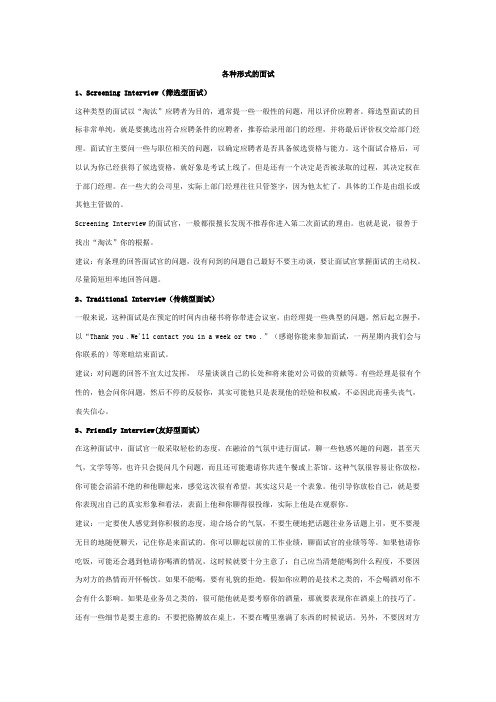
各种形式的面试1、Screening Interview(筛选型面试)这种类型的面试以“淘汰”应聘者为目的,通常提一些一般性的问题,用以评价应聘者。
筛选型面试的目标非常单纯,就是要挑选出符合应聘条件的应聘者,推荐给录用部门的经理,并将最后评价权交给部门经理。
面试官主要问一些与职位相关的问题,以确定应聘者是否具备候选资格与能力。
这个面试合格后,可以认为你已经获得了候选资格,就好象是考试上线了,但是还有一个决定是否被录取的过程,其决定权在于部门经理。
在一些大的公司里,实际上部门经理往往只管签字,因为他太忙了,具体的工作是由组长或其他主管做的。
Screening Interview的面试官,一般都很擅长发现不推荐你进入第二次面试的理由。
也就是说,很善于找出“淘汰”你的根据。
建议:有条理的回答面试官的问题,没有问到的问题自己最好不要主动谈,要让面试官掌握面试的主动权。
尽量简短坦率地回答问题。
2、Traditional Interview(传统型面试)一般来说,这种面试是在预定的时间内由秘书将你带进会议室,由经理提一些典型的问题,然后起立握手,以“Thank you .We'll contact you in a week or two .”(感谢你能来参加面试,一两星期内我们会与你联系的)等寒暄结束面试。
建议:对问题的回答不宜太过发挥,尽量谈谈自己的长处和将来能对公司做的贡献等。
有些经理是很有个性的,他会问你问题,然后不停的反驳你,其实可能他只是表现他的经验和权威,不必因此而垂头丧气,丧失信心。
3、Friendly Interview(友好型面试)在这种面试中,面试官一般采取轻松的态度,在融洽的气氛中进行面试,聊一些他感兴趣的问题,甚至天气,文学等等,也许只会提问几个问题,而且还可能邀请你共进午餐或上茶馆。
这种气氛很容易让你放松,你可能会滔滔不绝的和他聊起来,感觉这次很有希望,其实这只是一个表象。
英语口语考试四人剧本之interview面试
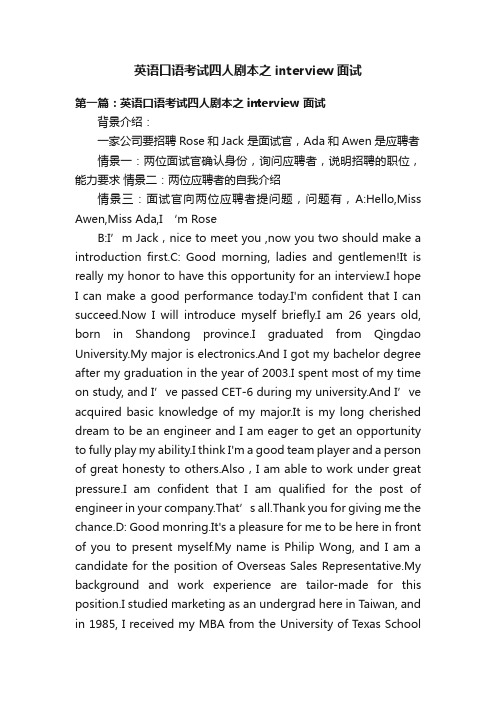
英语口语考试四人剧本之interview面试第一篇:英语口语考试四人剧本之interview 面试背景介绍:一家公司要招聘Rose和Jack 是面试官,Ada和Awen是应聘者情景一:两位面试官确认身份,询问应聘者,说明招聘的职位,能力要求情景二:两位应聘者的自我介绍情景三:面试官向两位应聘者提问题,问题有,A:Hello,Miss Awen,Miss Ada,I ‘m RoseB:I’m Jack,nice to meet you ,now you two should make a introduction first.C: Good morning, ladies and gentlemen!It is really my honor to have this opportunity for an interview.I hope I can make a good performance today.I'm confident that I can succeed.Now I will introduce myself briefly.I am 26 years old, born in Shandong province.I graduated from Qingdao University.My major is electronics.And I got my bachelor degree after my graduation in the year of 2003.I spent most of my time on study, an d I’ve passed CET-6 during my university.And I’ve acquired basic knowledge of my major.It is my long cherished dream to be an engineer and I am eager to get an opportunity to fully play my ability.I think I'm a good team player and a person of great honesty to others.Also,I am able to work under great pressure.I am confident that I am qualified for the post of engineer in your company.That’s all.Thank you for giving me the chance.D: Good monring.It's a pleasure for me to be here in front of you to present myself.My name is Philip Wong, and I am a candidate for the position of Overseas Sales Representative.My background and work experience are tailor-made for this position.I studied marketing as an undergrad here in Taiwan, and in 1985, I received my MBA from the University of Texas Schoolof Business.For five years now, I have utilized my skills and knowledge as the Assistant Director of Exports for magic kitchen Supplies.A position with your company would be both a learning experience and a great opportunity.I look forward to becoming part of the Action team.Thank you.A:Are you a multi-tasked individual?(你是一位可以同时承担数项工作的人吗?)or Do youwork well under stress or pressure?(你能承受工作上的压力吗?)C:Yes,I think so.The trait is needed in my current(or previous)position and I know I can handle it well.(这种特点就是我目前(先前)工作所需要的,我知道我能应付自如。
interview中最常问的题目及对答方案
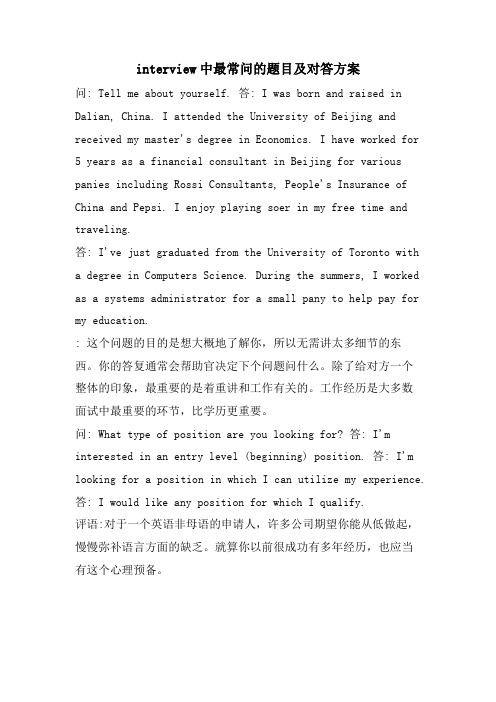
interview中最常问的题目及对答方案问: Tell me about yourself. 答: I was born and raised in Dalian, China. I attended the University of Beijing and received my master's degree in Economics. I have worked for 5 years as a financial consultant in Beijing for various panies including Rossi Consultants, People's Insurance of China and Pepsi. I enjoy playing soer in my free time and traveling.答: I've just graduated from the University of Toronto with a degree in Computers Science. During the summers, I worked as a systems administrator for a small pany to help pay for my education.: 这个问题的目的是想大概地了解你,所以无需讲太多细节的东西。
你的答复通常会帮助官决定下个问题问什么。
除了给对方一个整体的印象,最重要的是着重讲和工作有关的。
工作经历是大多数面试中最重要的环节,比学历更重要。
问: What type of position are you looking for? 答: I'm interested in an entry level (beginning) position. 答: I'm looking for a position in which I can utilize my experience. 答: I would like any position for which I qualify.评语:对于一个英语非母语的申请人,许多公司期望你能从低做起,慢慢弥补语言方面的缺乏。
Interview Questions 面试问题
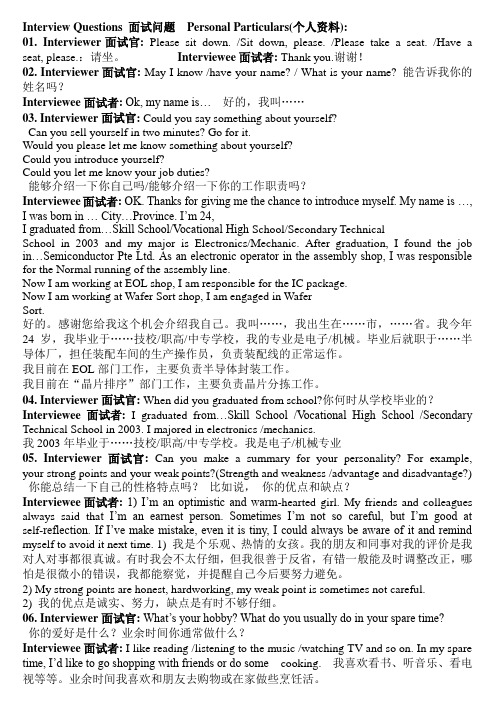
Interview Questions 面试问题Personal Particulars(个人资料):01. Interviewer面试官: Please sit down. /Sit down, please. /Please take a seat. /Have a seat, please.:请坐。
Interviewee面试者: Thank you.谢谢!02. Interviewer面试官: May I know /have your name? / What is your name? 能告诉我你的姓名吗?Interviewee面试者: Ok, my name is…好的,我叫……03. Interviewer面试官: Could you say something about yourself?Can you sell yourself in two minutes? Go for it.Would you please let me know something about yourself?Could you introduce yourself?Could you let me know your job duties?能够介绍一下你自己吗/能够介绍一下你的工作职责吗?Interviewee面试者: OK. Thanks for giving me the chance to introduce myself. My name is …, I was born in … City…Province. I’m 24,I graduated from…Skill School/V ocational High School/Secondary TechnicalSchool in 2003 and my major is Electronics/Mechanic. After graduation, I found the job in…Semiconductor Pte Ltd. As an electronic operator in the assembly shop, I was responsible for the Normal running of the assembly line.Now I am working at EOL shop, I am responsible for the IC package.Now I am working at Wafer Sort shop, I am engaged in WaferSort.好的。
人力资源简述面试的几种类型

在人力资源管理中,面试是选拔和评估候选人的重要环节。
面试可以分为不同的类型,以便更好地了解候选人的能力、素质和适应性。
以下是几种常见的面试类型:1.结构化面试(Structured Interview):结构化面试采用预定的问题和评估标准,确保对每位候选人都提出相同的问题。
这种面试类型有助于公正地比较不同候选人的回答,提高面试的客观性。
2.非结构化面试(Unstructured Interview):非结构化面试没有固定的问题和评估标准,面试官更加自由地与候选人交流。
虽然这样的面试更富弹性,但也可能导致评估不公正。
3.行为面试(Behavioral Interview):行为面试侧重于候选人过去的行为和经验,通过对候选人过去的行为进行深入了解,预测其未来的表现。
面试官通常会问关于具体情境、行为和结果的问题。
4.案例面试(Case Interview):案例面试要求候选人解决一个实际业务问题或情境,考察其解决问题的能力、分析能力和判断力。
这种面试常见于管理咨询等领域。
5.小组面试(Panel Interview):小组面试由多名面试官组成,一同面对候选人。
这样的面试可以从不同角度评估候选人,也可以减少个别面试官主观判断的影响。
6.技术面试(Technical Interview):技术面试主要用于评估候选人在特定领域的专业知识和技能,通常应用于工程、科技等领域。
7.压力面试(Stress Interview):压力面试通过刻意制造一些紧张和压力的氛围,测试候选人在压力下的应对能力和情绪控制能力。
8.二次面试(Second Interview):二次面试通常是在初步面试后,对于表现较好的候选人进行更深入的面试。
可以涉及更高层次的问题或与团队其他成员的交流。
每种类型的面试都有其独特的优势和适用场景。
面试官可以根据招聘的具体要求和岗位特点选择合适的面试类型,以全面了解候选人的综合素质。
interview的用法
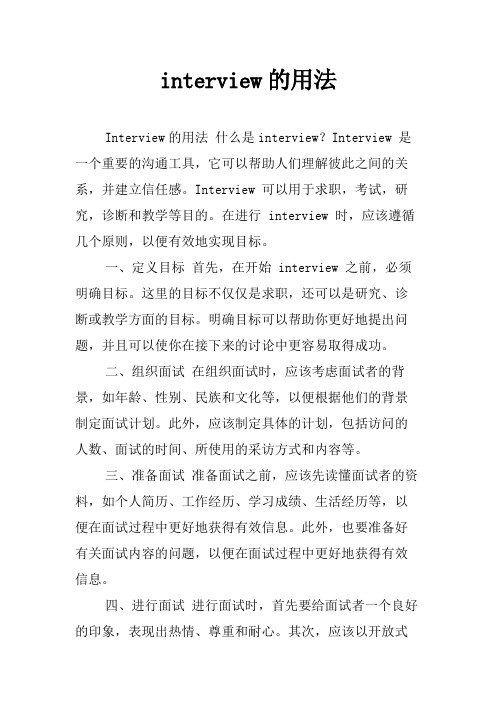
interview的用法Interview的用法什么是interview?Interview 是一个重要的沟通工具,它可以帮助人们理解彼此之间的关系,并建立信任感。
Interview 可以用于求职,考试,研究,诊断和教学等目的。
在进行 interview 时,应该遵循几个原则,以便有效地实现目标。
一、定义目标首先,在开始 interview 之前,必须明确目标。
这里的目标不仅仅是求职,还可以是研究、诊断或教学方面的目标。
明确目标可以帮助你更好地提出问题,并且可以使你在接下来的讨论中更容易取得成功。
二、组织面试在组织面试时,应该考虑面试者的背景,如年龄、性别、民族和文化等,以便根据他们的背景制定面试计划。
此外,应该制定具体的计划,包括访问的人数、面试的时间、所使用的采访方式和内容等。
三、准备面试准备面试之前,应该先读懂面试者的资料,如个人简历、工作经历、学习成绩、生活经历等,以便在面试过程中更好地获得有效信息。
此外,也要准备好有关面试内容的问题,以便在面试过程中更好地获得有效信息。
四、进行面试进行面试时,首先要给面试者一个良好的印象,表现出热情、尊重和耐心。
其次,应该以开放式的问题,提出精确的问题,以便获得更多的信息。
此外,在面试的过程中,应当让面试者有机会发表自己的观点。
五、处理面试处理面试时,要记录面试者的回答,以便后续分析。
在回答完面试问题后,也要对面试者进行评估,看看他们是否符合要求,以及他们是否具备必要的能力和素质。
最后,要将面试结果准确地记录下来,以便将来查阅。
Interview 是一个重要的沟通工具,它可以帮助人们理解彼此之间的关系,并建立信任感。
为了有效地实现目标,在进行 interview 时,应该明确目标,组织面试,准备面试,进行面试,并处理面试结果。
interview(面试技巧)
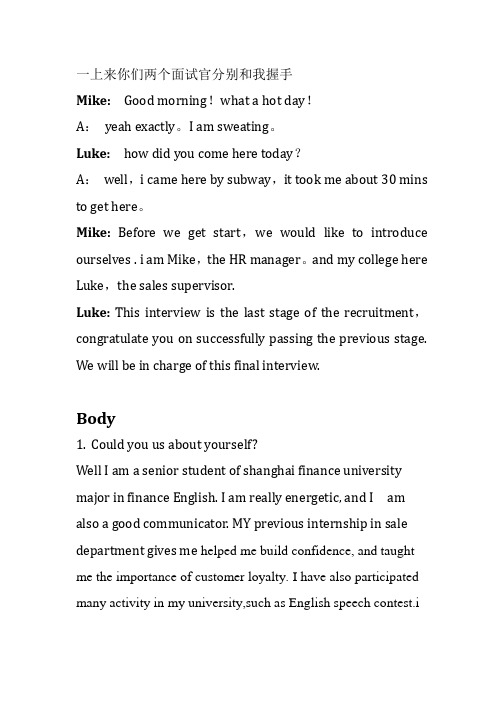
一上来你们两个面试官分别和我握手Mike:Good morning!what a hot day!A:yeah exactly。
I am sweating。
Luke: how did you come here today?A:well,i came here by subway,it took me about30 mins to get here。
Mike:Before we get start,we would like to introduce ourselves. i am Mike,the HR manager。
and my college here Luke,the sales supervisor.Luke: This interview is the last stage of the recruitment,congratulate you on successfully passing the previous stage. We will be in charge of this final interview.Body1.Could you us about yourself?Well I am a senior student of shanghai finance university major in finance English. I am really energetic, and I am also a good communicator. MY previous internship in sale department gives me helped me build confidence, and taught me the importance of customer loyalty. I have also participated many activity in my university,such as English speechcontest.ihave also organized many contest .i think this gives me the ability of management . and it is also where my advantage is 2 Could you talk about the understanding of our company and the position of application?your company is the fortune 500 firm and the world's third-biggest supermarket retailer with great mangement experience and excellent operational capability。
Case_Interview案例面试
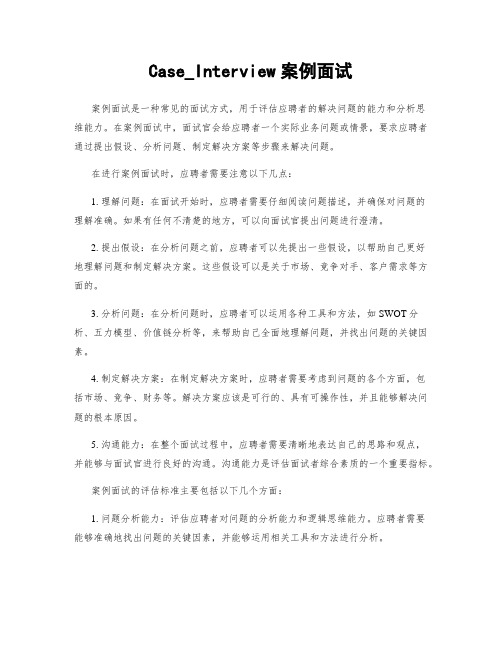
Case_Interview案例面试案例面试是一种常见的面试方式,用于评估应聘者的解决问题的能力和分析思维能力。
在案例面试中,面试官会给应聘者一个实际业务问题或情景,要求应聘者通过提出假设、分析问题、制定解决方案等步骤来解决问题。
在进行案例面试时,应聘者需要注意以下几点:1. 理解问题:在面试开始时,应聘者需要仔细阅读问题描述,并确保对问题的理解准确。
如果有任何不清楚的地方,可以向面试官提出问题进行澄清。
2. 提出假设:在分析问题之前,应聘者可以先提出一些假设,以帮助自己更好地理解问题和制定解决方案。
这些假设可以是关于市场、竞争对手、客户需求等方面的。
3. 分析问题:在分析问题时,应聘者可以运用各种工具和方法,如SWOT分析、五力模型、价值链分析等,来帮助自己全面地理解问题,并找出问题的关键因素。
4. 制定解决方案:在制定解决方案时,应聘者需要考虑到问题的各个方面,包括市场、竞争、财务等。
解决方案应该是可行的、具有可操作性,并且能够解决问题的根本原因。
5. 沟通能力:在整个面试过程中,应聘者需要清晰地表达自己的思路和观点,并能够与面试官进行良好的沟通。
沟通能力是评估面试者综合素质的一个重要指标。
案例面试的评估标准主要包括以下几个方面:1. 问题分析能力:评估应聘者对问题的分析能力和逻辑思维能力。
应聘者需要能够准确地找出问题的关键因素,并能够运用相关工具和方法进行分析。
2. 解决方案的可行性:评估应聘者制定解决方案的能力。
解决方案应该是可行的,具有可操作性,并且能够解决问题的根本原因。
3. 沟通能力:评估应聘者的沟通能力和表达能力。
应聘者需要能够清晰地表达自己的思路和观点,并能够与面试官进行良好的沟通。
4. 团队合作能力:评估应聘者在团队合作中的能力。
案例面试中往往会有小组讨论环节,应聘者需要能够积极参与讨论,与团队成员合作,共同制定解决方案。
在准备案例面试时,应聘者可以通过以下几个途径提高自己的能力:1. 阅读案例分析书籍:可以通过阅读相关的案例分析书籍,了解不同行业的案例,并学习分析问题的方法和技巧。
Englishinterview英语面试重点问题(五篇模版)

Englishinterview英语面试重点问题(五篇模版)第一篇:English interview英语面试重点问题Introduce youselfHello, it's my pleasure to meet you.It is really my honor to have this opportunity for a interview, I hope I can make a good performance today.I'm confident that I can succeed.Now I will introduce myself.My name is Huanglinyin.I am 21 years old, born in Guangdong.I was graduated from Beijing normal university zhuhai.My major is Electronic commerce.I spend most of my time on study, I have passed CET4/6.and I have study a lot of basic knowledge of my major during my school time.I think I am able to work under pressure Also I am a hard working people.That’s all.Thank you for giving me the chance.优点缺点: My advantage is I've set some high goals for myself.I am able to work under pressure, Also I am a hard working people, I can see what needs to be done and do it, and always look for better ways to finish the job.I am a honest people and I work well with others.我的优点是,我会给自己顶下高目标,我有能力在压力下工作,我也是个努力工作的人,我可以看到什么需要做然后去完成它,我经常寻找更好完成工作的方法。
interview分类

什么是interview?An interview is a conversation between two people (the interviewer and the interviewee) where questionsare asked by the interviewer to obtain information from the interviewee.--wikipediainterview的目的是什么?Exchange informations. 交换信息具体地说就是面试人试图了解被面试人是否是他要寻找的合适人选同时被面试人也要了解这个职位是否如自己期望interview分类:根据对象分类1. 和教授interview2. 和招生负责人interview3. 和工作公司interview (HR or technical manager)interview分类:根据形式分类1. One-to-One interview2. Panel Interview3. Lunch/Dinner Interview4. Telephone/Videoconference Interview5. MMI6. Presentationinterview分类:根据问题内容分类1. Traditional2. Technical3. Behavioural4. Situational5. Impossible6. Illegal questions如何准备interview1. 判断interview的对象2. 判断interview的形式和内容3. 充分了解对方4. 推测可能出现的问题进行思考5. mock interview6. 对细节的最后思考和准备on the day of interviewtipsafter the interviewtipsinterview分类:根据对象分类1. 和教授interview对于申请科研式研究生的同学,经常会需要和教授interview. 教授的目的是了解一下这个学生的能力,对未来的规划, 以确定学生是否是自己研究生的合适人选.一般来说,和教授interview往往会用电话面试的形式,偶尔有机会可能是当面一对一面试. 内容一般包括Traditional, Technical, Behavioural等问题.和教授的interview一般相对比较随和,主要会是聊天的形式,其间夹杂一些问题. 有的时候教授可能会提前给你文章读,然后在面试时问你看法.具体问题类型和准备方式见后文2. 和招生负责人interview对于申请本科,授课式研究生和co-op等项目的同学,更多遇到的是和招生负责人面试的情况。
Case_Interview案例面试
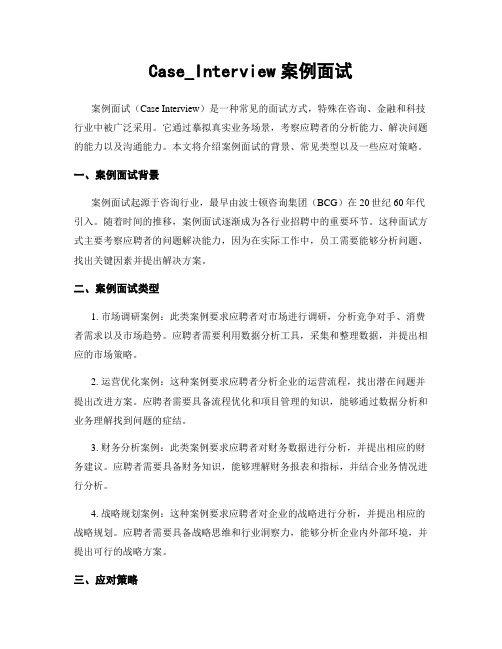
Case_Interview案例面试案例面试(Case Interview)是一种常见的面试方式,特殊在咨询、金融和科技行业中被广泛采用。
它通过摹拟真实业务场景,考察应聘者的分析能力、解决问题的能力以及沟通能力。
本文将介绍案例面试的背景、常见类型以及一些应对策略。
一、案例面试背景案例面试起源于咨询行业,最早由波士顿咨询集团(BCG)在20世纪60年代引入。
随着时间的推移,案例面试逐渐成为各行业招聘中的重要环节。
这种面试方式主要考察应聘者的问题解决能力,因为在实际工作中,员工需要能够分析问题、找出关键因素并提出解决方案。
二、案例面试类型1. 市场调研案例:此类案例要求应聘者对市场进行调研,分析竞争对手、消费者需求以及市场趋势。
应聘者需要利用数据分析工具,采集和整理数据,并提出相应的市场策略。
2. 运营优化案例:这种案例要求应聘者分析企业的运营流程,找出潜在问题并提出改进方案。
应聘者需要具备流程优化和项目管理的知识,能够通过数据分析和业务理解找到问题的症结。
3. 财务分析案例:此类案例要求应聘者对财务数据进行分析,并提出相应的财务建议。
应聘者需要具备财务知识,能够理解财务报表和指标,并结合业务情况进行分析。
4. 战略规划案例:这种案例要求应聘者对企业的战略进行分析,并提出相应的战略规划。
应聘者需要具备战略思维和行业洞察力,能够分析企业内外部环境,并提出可行的战略方案。
三、应对策略1. 理清思路:在面对案例面试时,应聘者首先要理清思路,明确问题的关键点。
可以通过提问来澄清问题,确保自己对问题的理解准确。
2. 数据分析:案例面试通常会提供大量数据,应聘者需要具备数据分析的能力。
可以通过制作图表、计算指标等方式来对数据进行分析,并提炼出关键信息。
3. 结构化思维:在回答问题时,应聘者需要采用结构化思维,将问题拆解成多个子问题,并逐一解决。
这样可以使回答更有条理,也更容易找到解决问题的关键点。
4. 沟通表达:案例面试不仅考察应聘者的分析能力,还考察其沟通和表达能力。
有关面试的英语单词
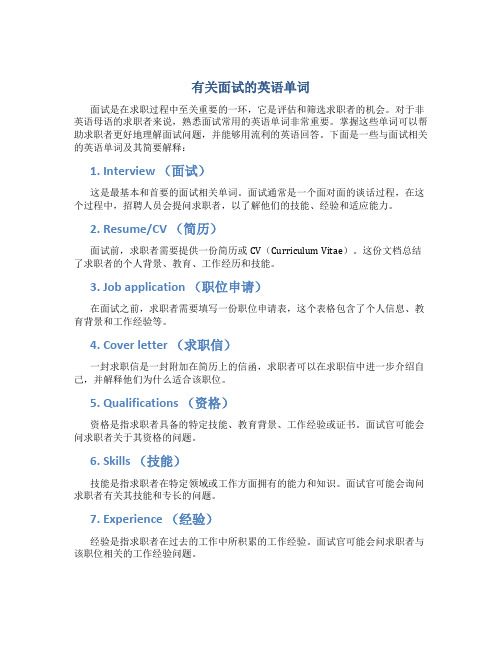
有关面试的英语单词面试是在求职过程中至关重要的一环,它是评估和筛选求职者的机会。
对于非英语母语的求职者来说,熟悉面试常用的英语单词非常重要。
掌握这些单词可以帮助求职者更好地理解面试问题,并能够用流利的英语回答。
下面是一些与面试相关的英语单词及其简要解释:1. Interview (面试)这是最基本和首要的面试相关单词。
面试通常是一个面对面的谈话过程,在这个过程中,招聘人员会提问求职者,以了解他们的技能、经验和适应能力。
2. Resume/CV (简历)面试前,求职者需要提供一份简历或CV(Curriculum Vitae)。
这份文档总结了求职者的个人背景、教育、工作经历和技能。
3. Job application (职位申请)在面试之前,求职者需要填写一份职位申请表,这个表格包含了个人信息、教育背景和工作经验等。
4. Cover letter (求职信)一封求职信是一封附加在简历上的信函,求职者可以在求职信中进一步介绍自己,并解释他们为什么适合该职位。
5. Qualifications (资格)资格是指求职者具备的特定技能、教育背景、工作经验或证书。
面试官可能会问求职者关于其资格的问题。
6. Skills (技能)技能是指求职者在特定领域或工作方面拥有的能力和知识。
面试官可能会询问求职者有关其技能和专长的问题。
7. Experience (经验)经验是指求职者在过去的工作中所积累的工作经验。
面试官可能会问求职者与该职位相关的工作经验问题。
8. Strengths and weaknesses (优点和缺点)面试官可能会要求求职者列举其优点和缺点。
求职者应该准备好针对这些问题的回答,并以积极和诚实的态度回答。
9. Teamwork (团队合作)团队合作是指在一个团队中与他人协作完成工作。
面试者可能会问求职者在过去的工作中如何与团队合作。
10. Communication skills (沟通能力)沟通能力是指求职者有效表达和交流的能力。
Interview面试对话(优秀6篇)

Interview面试对话(优秀6篇)(实用版)编制人:__________________审核人:__________________审批人:__________________编制单位:__________________编制时间:____年____月____日序言下载提示:该文档是本店铺精心编制而成的,希望大家下载后,能够帮助大家解决实际问题。
文档下载后可定制修改,请根据实际需要进行调整和使用,谢谢!并且,本店铺为大家提供各种类型的实用范文,如工作总结、策划方案、演讲致辞、报告大全、合同协议、条据书信、党团资料、教学资料、作文大全、其他范文等等,想了解不同范文格式和写法,敬请关注!Download tips: This document is carefully compiled by this editor. I hope that after you download it, it can help you solve practical problems. The document can be customized and modified after downloading, please adjust and use it according to actual needs, thank you!In addition, this shop provides various types of practical sample essays for everyone, such as work summary, planning plan, speeches, reports, contracts and agreements, articles and letters, party and group materials, teaching materials, essays, other sample essays, etc. Please pay attention to the different formats and writing methods of the model essay!Interview面试对话(优秀6篇)在英语面试的时候我们总是考虑:如何回答面试官的问题,如何才能作出得体的回答。
50个英文面试常见问题及答案

50个英文面试常见问题及答案(经典版)编制人:__________________审核人:__________________审批人:__________________编制单位:__________________编制时间:____年____月____日序言下载提示:该文档是本店铺精心编制而成的,希望大家下载后,能够帮助大家解决实际问题。
文档下载后可定制修改,请根据实际需要进行调整和使用,谢谢!并且,本店铺为大家提供各种类型的经典范文,如工作总结、实习报告、合同协议、条据书信、职业规划、规章制度、心得体会、应急预案、教学资料、其他范文等等,想了解不同范文格式和写法,敬请关注!Download tips: This document is carefully compiled by this editor. I hope that after you download it, it can help you solve practical problems. The document can be customized and modified after downloading, please adjust and use it according to actual needs, thank you!Moreover, our store provides various types of classic sample texts for everyone, such as work summaries, internship reports, contract agreements, document letters, career planning, rules and regulations, experiences, emergency plans, teaching materials, other sample texts, etc. If you want to learn about different sample formats and writing methods, please pay attention!50个英文面试常见问题及答案50个英文面试常见问题及答案复试英语口语各类面试问题汇总考研英语面试中,在自我介绍完了老师就会开始问你问题这里列出一些常见的问题今天本店铺给大家带来50个英文面试常见的英文面试题目及参考答案,希望对你准备英文面试有所帮助哦!50个英文面试常见问题及答案Review these typical interview questions and think about how you wouldanswer them.Read the questions listed; you will also find somestrategy suggestions with it.1.Tell me about yourself:The most often asked question in interviews.You need to have a short statement prepared in your mind.Be careful that it does not sound rehearsed.Limit it to work-related items unless instructed otherwise.Talk about things you have done and jobs you have held that relate to the position you are interviewing for.Start with the item farthest back and work up to the present.2.Why did you leave your last job?Stay positive regardless of the circumstances.Never refer to a major problem with management and never speak ill of supervisors, co-workers or the organization.If you do, youwill be the one looking bad.Keep smiling and talk about leaving for a positive reason such as an opportunity, a chance to do something special or other forward-looking reasons.3.What eXperience do you have in this field?Speak about specifics that relate to the position you are applying for.If you do not have specific eXperience, get as close as you can.4.Do you consider yourself successful?You should always answer yes and briefly eXplain why.A good eXplanation is that you have set goals, and you have met some and are on track to achieve the others.5.What do co-workers say about you?Be prepared with a quote or two from co-workers.Either a specific statement or a paraphrase will work.Jill Clark, a co-worker at Smith Company, always said I was the hardest workers she had ever known.It is as powerful as Jill having said it at the interview herself.6.What do you know about this organization?This question is one reason to do some research on the organization before the interview.Find out where they have been and where they are going.What are the current issues and whoare the major players?7.What have you done to improve your knowledge in the last year?Try to include improvement activities that relate to the job.A wide variety of activities can be mentioned as positive self-improvement.Have some good ones handy to mention.8.Are you applying for other jobs?Be honest but do not spend a lot of time in this area.Keep the focus on this job and what you can do for this organization.Anything else is a distraction.9.Why do you want to work for this organization?This may take some thought and certainly, should be based on the research you have done on the organization.Sincerity is eXtremely important here and will easily be sensed.Relate it to your long-term career goals.10.Do you know anyone who works for us?Be aware of the policy on relatives working for the organization.This can affect your answer even though they asked about friends not relatives.Be careful to mention a friend only if they are well thought of.11.What kind of salary do you need?A loaded question.A nasty little game that you will probably lose if you answer first.So, do not answer it.Instead,say something like,Thats a tough question.Can you tell me the range for this position?In most cases, the interviewer, taken off guard, will tell you.If not,say that it can depend on the details of the job.Then give a wide range.12.Are you a team player?You are, of course, a team player.Be sure to have eXamples ready.Specifics that show you often perform for the good of the team rather than for yourself are good evidence of your team attitude.Do not brag,just say it in a matter-of-fact tone.This is a key point.13.How long would you eXpect to work for us if hired?Specifics here are not good.Something like this should work: Id like it to be a long time.Or As long as we both feel Im doinga good job.14.Have you ever had to fire anyone? How did you feel about that?This is serious.Do not make light of it or in any way seem like you like to fire people.At the same time, you will doit when it is the right thing to do.When it comes to the organization versus the individual who has created a harmful situation, you will protect the organization.Remember firing is not the same as layoff or reduction in force.15.What is your philosophy towards work?The interviewer is not looking for a long or flowery dissertation here Do you have strong feelings that the job gets done? Yes.Thats the type of answer that works best here.Short and positive, showing a benefit to the organization.16.If you had enough money to retire right now, would you?Answer yes if you would.But since you need to work, this is the type of work you prefer.Do not say yes if you do not mean it.17.Have you ever been asked to leave a position?If you have not, say no.If you have, be honest, brief and avoid saying negative things about the people or organization involved.18.EXplain how you would be an asset to this organizationYou should be anXious for this question.It gives you a chance to highlight your best points as they relate to the position being discussed.Give a little advance thought to this relationship.19.Why should we hire you?point out how your assets meet what the organization needs.Do not mention any other candidates to make a comparison.20.Tell me about a suggestion you have madeHave a good one ready.Be sure and use a suggestion that was accepted and was then considered successful.One related to the type of work applied for is a real plus.21.What irritates you about co-workers?This is a trap question.Think real hard but fail to come up with anything that irritates you.A short statement that you seem to get along with folks is great.22.What is your greatest strength?Numerous answers are good, just stay positive.A few good eXamples:Your ability to prioritize, Your problem-solving skills,Your ability to work under pressure, Your ability to focus on projects, Your professional eXpertise, Your leadership skills,Your positive attitude23.Tell me about your dream job.Stay away from a specific job.You cannot win.If you say the job you are contending for is it, you strain credibility.If you say another job is it, you plant the suspicion that youwill be dissatisfied with this position if hired.The best is to stay genetic and say something like: A job where I love the work, like the people, can contribute and can wait to get to work.24.Why do you think you would do well at this job?Give several reasons and include skills, eXperience and interest.25.What are you looking for in a job?26.What kind of person would you refuse to work with?Do not be trivial.It would take disloyalty to the organization,violence or lawbreaking to get you to object.Minor objections willlabel you as a whiner.27.What is more important to you: the money or the work?Money is always important,but the work is the most important.There is no better answer.28.What would your previous supervisor say your strongest point is?There are numerous good possibilities:Loyalty, Energy, positive attitude, Leadership, Team player,EXpertise,Initiative,patience,Hard work,Creativity, problem solver29.Tell me about a problem you had with a supervisorBiggest trap of all.This is a test to see if you will speak ill of your boss.If you fall for it and tell about a problem with a former boss, you may well below the interview right there.Stay positive and develop a poor memory about any trouble with a supervisor.30.What has disappointed you about a job?Don get trivial or negative.Safe areas are few but can include: Not enough of a challenge.You were laid off in a reduction Company did not win a contract, which would have given you more responsibility.31.Tell me about your ability to work under pressure.You may say that you thrive under certain types of pressure.Give an eXample that relates to the type of position applied for.32.Do your skills match this job or another job more closely?probably this one.Do not give fuel to the suspicion that you may want another job more than this one.33.What motivates you to do your best on the job?This is a personal trait that only you can say, but good eXamples are: Challenge, Achievement, Recognition34.Are you willing to work overtime? Nights? Weekends?This is up to you.Be totally honest.35.How would you know you were successful on this job?Several ways are good measures:You set high standards for yourself and meet them.Your outcomes are a success.Your boss tell you that you are successful36.Would you be willing to relocate if required?You should be clear on this with your family prior to the interview if you think there is a chance it may come up.Do not say yes just to get the job if the real answer is no.This can create a lot of problems later on in your career.Be honest at this point and save yourself future grief.37.Are you willing to put the interests of the organization ahead ofyour own?This is a straight loyalty and dedication question.Do not worry about the deep ethical and philosophical implications.Just say yes.38.Describe your management style.Try to avoid labels.Some of the more common labels, like progressive,salesman or consensus, can have several meanings or descriptions depending on which management eXpert you listen to.The situational style is safe, because it says you willmanage according to the situation, instead of one size fits all.39.What have you learned from mistakes on the job?Here you have to come up with something or you strain credibility.Make it small, well intentioned mistake with a positive lesson learned.An eXample would be working too far ahead of colleagues on a project and thus throwing coordination off.40.Do you have any blind spots?Trick question.If you know about blind spots, they are no longer blind spots.Do not reveal any personal areas of concern here.Let them do their own discovery on your bad points.Do not hand it to them.41.If you were hiring a person for this job, what would you look for?Be careful to mention traits that are needed and that you have.42.Do you think you are overqualified for this position?Regardless of your qualifications, state that you are very well qualified for the position.43.How do you propose to compensate for your lack of eXperience?First, if you have eXperience that the interviewer does not know about,bring that up: Then, point out (if true)that you are a hard working quick learner.44.What qualities do you look for in a boss?Be generic and positive.Safe qualities are knowledgeable,a sense of humor, fair, loyal to subordinates and holder of high standards.All bosses think they have these traits.45.Tell me about a time when you helped resolve a dispute betweenothers.pick a specific incident.Concentrate on your problem solving technique and not the dispute you settled.46.What position do you prefer on a team working on a project?Be honest.If you are comfortable in different roles, point that out.47.Describe your work ethic.Emphasize benefits to the organization.Things like,determination to get the job done and work hard but enjoy your work are good.48.What has been your biggest professional disappointment?Be sure that you refer to something that was beyond your control.Show acceptance and no negative feelings.49.Tell me about the most fun you have had on the job.Talk about having fun by accomplishing something for the organization.50.Do you have any questions for me?Always have some questions prepared.Questions prepared where you will be an asset to the organization are good.How soon will I be able to be productive? and What type of projects will I be able to assist on?英文面试问题及答案Q:Can you sell yourself in two minutes? Go for it.(你能在两分钟内自我推荐吗?大胆试试吧!)A:With my qualifications and eXperience, I feel I am hardworking,responsible and diligent in any project I undertake.Your organization could benefit from my analytical and interpersonal skills.(依我的资格和经验,我觉得我对所从事的每一个项目都很努力、负责、勤勉。
- 1、下载文档前请自行甄别文档内容的完整性,平台不提供额外的编辑、内容补充、找答案等附加服务。
- 2、"仅部分预览"的文档,不可在线预览部分如存在完整性等问题,可反馈申请退款(可完整预览的文档不适用该条件!)。
- 3、如文档侵犯您的权益,请联系客服反馈,我们会尽快为您处理(人工客服工作时间:9:00-18:30)。
INTERVIEW
1.Telephone Screening Interview
•This interview saves the employer time by eliminating candidates based on essential criteria
•such as particular job requirements, education or required skills.
2.In-person Screening Interview
•verify the candidate’s qualifications
•establish a preliminary impression
•attitude, interest and professional style
•Human Resources Department
↓
decision-maker
3.Selection Interview
•decision-makers
•probe qualifications
& ability to establish rapport
•more than one interview
•present yourself effectively
•be yourself & sell yourself
4.Work Sample Interview
•“show your wares!”
• a graphic artist→portfolio
•salesperson→a sales presentation
•An office worker→a business letter
5.Peer Group Interview
•prospective co-workers
•evaluate the candidates
•determining how he/she would fit in
6.Group Interview
•also called panel interview(≧3)
•all asking questions
•show confidence
•maintain eye contact with the other group members
How to shine in a group interview ?
•There are mainly two types of questions
•creative / problem-solving questions
•1)active talking is better than creative ideas
•2) to talk your ideas bravely (make a summary, and set another topic) •3) effective communication
•4) take notes and make some supplements
•5) be clear and confident
•6) be concentrated and avoid unacceptable non-verbal behaviors. 7.Luncheon Interview
•how to handle in a social situation
•Manager(HR Department),employees
•make an impression
Tips:
Select healthy and easy things to eat
↓
questions ,conversation
8.Stress Interview
•interrogator
•be treated like the enemy
• a number of offensive questions
•keep cool & take time in responding
•handle stress。
